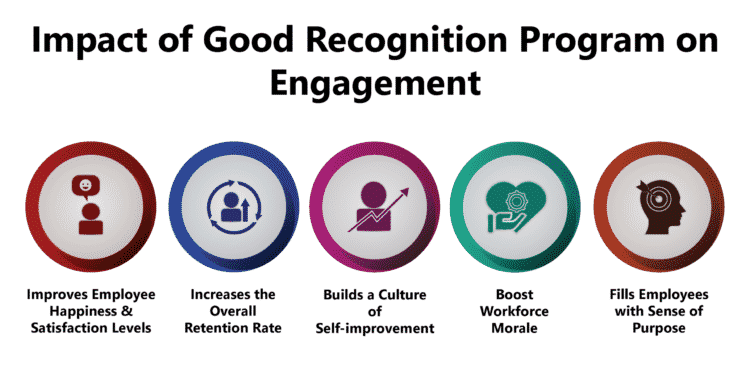1. Enhances employee satisfaction and retention: A good recognition program improves employees’ happiness, job satisfaction, and sense of belonging, leading to better retention and reducing the likelihood of employees seeking other job opportunities.
2. Builds a culture of self-improvement: Recognition motivates the entire workforce to enhance their performance, fostering a culture of continuous self-improvement and adaptability to changing business needs.
3. Boosts morale and engagement: Recognition programs enhance employee morale by making them feel valued, which in turn increases their trust in the organization and their willingness to take on new challenges.
4. Gives employees a sense of purpose: Recognizing employees helps them see how their work contributes to business goals, strengthening their loyalty and motivating them to work harder and smarter.
Most organizations today prioritize enhancing employee engagement and motivation levels for better productivity and excellent retention. It has led organizations to focus on setting up workplace employee recognition programs.
Most organizations still believe that good salaries, benefits, and incentives are sufficient to build a dedicated and self-motivated workforce.
However, employees today prefer to work for organizations where their skills are valued and appreciated and their contribution is acknowledged and rewarded.
They want to feel like an integral part of the organization rather than a resource for completing specific tasks.

By recognizing the good work and desirable behaviors of employees, organizations instill this sense of belonging deep in their psyche.
It helps enhance the happiness and satisfaction levels of the employees and inspires them to perform better.
Thus, a well-designed and implemented recognition program can help drive employee engagement quite effectively.
Organizations today are becoming increasingly employee-centric and seek to involve their employees more significantly in business processes.
However, this may be difficult especially if the employees do not feel emotionally connected or committed towards the organization.
A good recognition program can help overcome this challenge in the following ways:
1. Improves Employee Happiness and Satisfaction Levels
2. Increases the Overall Retention Rate
3. Build a Culture of Self-improvement
4. Boosts Workforce Morale
5. Fills the Employees with a Sense of Purpose


Proper and timely recognition of employees fills them with a sense of pride and happiness.
They feel valued and respected for the tasks and responsibilities assigned to them.
This improves their overall job satisfaction as well as their sense of belonging and commitment to the organization.
Recognition programs thus go a long way in enhancing employee motivation.
It makes them feel more satisfied with their current organization.

Most organizations today face the challenge of retaining their top talent for extended periods.
Implementing a good recognition program can prove highly beneficial in this context.
As employees feel valued and appreciated for their contribution, they are least likely to seek other employment options, leading to better retention.
It helps improve the organization’s brand value as an employer and helps attract top talent in the future.

A good recognition program can play a significant role in helping organizations build a culture of self-improvement.
Recognizing the efforts of individual employees motivates the entire workforce and inspires them to improve their performance.
As a result, there is an overall improvement in employee productivity, which fosters a culture of continuous self-improvement.
As business needs change, the workforce will likely be more willing to learn new skills and enhance their competency levels.

An employee recognition program indicates that employers are monitoring the work and efficiency of their employees.
It helps to boost employees’ morale and inspires them to pay greater attention to productivity and innovation.
By offering appropriate recognition, organizations make the employees feel like a valuable asset which further enhances their trust in their employers.
Hence, they might willingly take up tasks and responsibilities that are ordinarily challenging and beyond their current competency levels, helping the business grow much faster.

Rewarding and recognizing employees can give them a sense of purpose and further strengthen their loyalty to their organization by helping them better understand how their work contributes to business growth.
As employees become aware that they are working towards shared business goals, it motivates them to work harder and smarter.
Most importantly, it helps eliminate employees’ uncertainties about their positions and responsibilities.
Building a business culture and work environment based on employee recognition can deeply impact employee engagement and productivity. This can, in turn, boost the growth trajectory of the organization and give it a competitive edge.

Lead author: Sagar Chaudhuri, the Co-Founder and CEO of HiFives. He is an HR Tech Evangelist with over 25 years of experience in both corporate and entrepreneurial settings. Previously, Sagar has held leadership roles with companies such as Genpact, Infosys, and ICICI Bank. He has an engineering degree from IIT Kharagpur and an MBA from IIM Lucknow. Connect on LinkedIn
To stay updated on the latest HiFives blogs, follow us on Twitter (@MyHiFives)